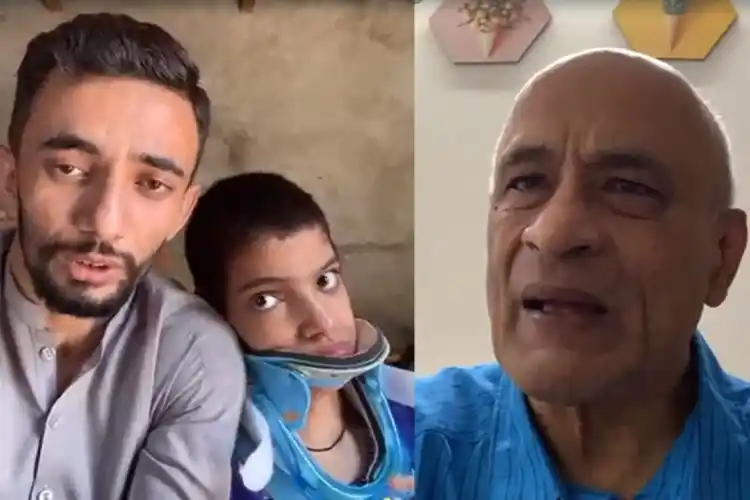
Sabir Hussain/New Delhi
Almost two months after a life-changing surgery at Delhi’s Apollo hospital to straighten an impossibly bent neck, Pakistani teenager Afsheen Gul is recovering well at her home in Mithi in Sindh province.
But Afsheen, who also suffers from cerebral palsy, still has a long to go before her condition stabilizes for good.
The teenager who returned home in the last week of March along with her brother Mohammad Yakoob Kumbar after an overland journey through the Wagah border remains under remote medical supervision.
Spine surgeon Dr. Rajagopalan Krishnan who led the team for Afsheen’s surgery recently reviewed her condition through a video call.
Asked how long he would be monitoring Afsheen’s recovery, Dr. Krishnan said, “Around 5 years even if we review her at 6 monthly intervals.”
She can now walk on her own but Dr. Krishnan has advised the family that another person must be close to her.
Yakoob told Awaz-The Voice on phone from Mithi that his sister’s condition is improving.
“She can now eat while seating which wasn’t the case before the surgery when she had to be fed while lying in bed,” he said.
But because of her cerebral palsy, it becomes difficult at times to convince her that she needs to wear an Aspen collar which is used to help stabilise the neck after injury or surgery. And that is a worry for Dr. Krishnan.
“Yaqoob says she has become very obstinate after returning home and is thoroughly spoiled! She is improving steadily. I am happy with her progress but she is very naughty and wears only the soft collar when I told the family she has to use Aspen collar all the time and soft collar only in bed,” DR. Krishnan said.
He also explained why not wearing the Aspen collar could prove troublesome.
“It puts bony fusion at risk and puts strain on the implants. So, not wearing it increases the risk of implant failure, screw pull out, screw breakage etc. The implants are scaffolds to hold the head and neck straight but it is the bone grafting I have done along with the implants that will create a solid bony bridge (fusion) from the skull to the upper thoracic spine. It takes around 6 months to be solid but I can only keep telling them, I can’t enforce compliance and discipline from here. I can only hope that the family is careful with her,” the surgeon said.
“Soft collar is short and only around the neck and is meant for comfort and minimal support. Aspen collar supports head and neck.”
Following Dr. Krishnan’s insistence that Afsheen wears the Aspen collar most of the time, her family has managed to ensure that she complies with the doctor’s instructions.
“She now wears the Aspen collar most of the day as the doctor ordered and the soft collar when she lies down,” Yakoob said.
Dr. Krishnan has also told the family that Afsheen should never be given any food to eat while she is lying down to prevent any possible blockage in the food pipe which could endanger her life.
With the teenager still a few years from complete recovery, the family has to be extremely careful that she follows all instructions of the doctor. It is all the more necessary since the intervention of Dr. Krishnan or his team can only be through video calls and medical help during an emergency may not be possible.
Afsheen has never been to school because of her bent neck and cerebral palsy. During the review meeting, Yakoob told Dr. Krishnan that his sister is showing interest in drawing and paintings. But attending a school still seems improbable for now.
“Unfortunately, there is no school in Mithi for children with special needs,” Yakoob said.
Also Read: Pak teen with impossibly bent neck gets kiss of life in Delhi
She still needs assistance when using the bathroom/washroom. For the impoverished family, chronic water scarcity in Mithi is another headache while taking care of Afsheen, whose name means ‘shine like a star’.
